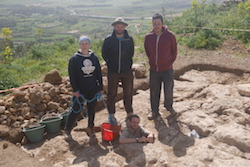Malta: a case study in the rise and fall of civilisations
Humans arrived in Malta at least 700 years earlier than previously thought, the ground-breaking Fragsus (Fragility and sustainability in restricted island environments: adaptation, cultural change and collapse in prehistory) project has revealed. “Malta experienced two or three episodes of colonisation, possibly with gaps in human occupation of as much as 1 000 years,” says project coordinator Professor Caroline Malone, from Queen’s University Belfast in the UK. “This was never suspected before. In fact, little research has been directed towards understanding why colonial experiments fail or succeed on small islands.” This was a key objective of the Fragsus project, which has examined the impact of the first human settlements on Malta to assess the rapidity of deforestation, erosion and degradation. The results have sparked great interest in Malta, where tourism forms a critical element of the economy. They could potentially boost the conservation of valuable heritage sites on the heavily urbanised and populated islands. Over a quarter of the islands are already under concrete. The project has also involved around 100 students in on-site excavation work and led to five ongoing PhDs, helping to ensure that Fragsus’ work will continue into the future. A follow-on Marie Curie-funded project will now use project data to better understand Malta’s ancient past. Uncovering Malta’s past When Malta was first colonised in the 6th millennium BC, pristine soil and forest covered the landscape, but within centuries the landscape was bare and under intensive cultivation. A temple culture emerged out of this precarious environment, which was sustained over centuries. “There is something about small geographic spaces that gives rise to intense, complex social states,” says Prof. Malone. “Think of Cyprus, or Easter Island.” Some 2 500 years after the first settlement however, this unique and isolated socio-economic system apparently collapsed. “Malta has some of the most distinctive archaeology in Europe, which has never been fully appreciated,” explains Prof. Malone, who has spent more than 30 years pioneering excavations on the islands. “The rapid rise in population density, wealth and with it the destruction of the island’s heritage and landscape made a pressing case for further investigation.” The team set itself some ambitious questions. For example, how did a very small island community in prehistoric times manage to sustain complex life over millennia and were the monumental temples instrumental in the process of sustaining cultural life? The Fragsus project also sought to identify the socio-economic or environmental failure at the end of the island’s temple culture, which may have caused society to collapse or to drastically change. “We tackled these questions through archaeological surveys and excavations as well as soil extractions containing ancient pollens and invertebrates,” she explains. “The project has been a melting pot of ideas. We also analysed dietary and DNA data from a large burial complex to provide a human dimension to archaeological evidence.” Finally, radiocarbon dating helped the team to build a robust chronological “calendar” of time and change on the islands. Fragile past, fragile future Some of the findings of the project, which ended in April 2018, are on show at an exhibition at the National Museum of Archaeology of Malta in Valletta. This show encapsulates the project’s ambition of raising awareness of Malta’s unique and little-understood ancient past, which in many ways echoes current environmental predicaments on the densely populated and urbanised islands. “We hope archaeological approaches will be transformed,” says Prof. Malone. “We have highlighted the importance of gathering DNA samples and shown that this can be done in southern Europe, where previously it was thought that heat damage made this impossible.” Project results will continue to be published for some time to come, while digitised human remains can be used in further studies. “Our hope is that Fragsus will have a lasting impact on conservation work in Malta, and that this will be accelerated in the future,” she adds.
Keywords
Fragsus, Malta, island, climate change, history, society, civilisation, community, village, conservation, archaeology, DNA, cultivation, deforestation, erosion



